Law Enforcement
To help keep you, your passengers, and other vessel's passengers safe, waterways in New York are patrolled by specially trained federal, state, and local law enforcement agencies to enforce navigation law. To avoid injury to friends and family, familiarize yourself with New York's boating laws. It's the best way to avoid a ticket or having your trip terminated by law enforcement.
Most marine fatalities occur when the victim falls overboard, the boat capsizes, or a collision with another object. The most common contributing factors are intoxication and not wearing lifejackets. Below are the most common reasons that law enforcement terminates a voyage:
Like our roads and highways, waterways in New York are patrolled by law enforcement agencies to help keep everyone safe. Officers from the US Coast Guard, State Police, and local law enforcement agencies all patrol in New York State waters and have the authority to enforce the navigation law. To avoid a ticket or having your trip terminated by law enforcement, familiarize yourselmf with the most common operating laws on this page.
Safety Equipment and Courtesy Vessel Inspections
If you do not have the proper safety equipment
 aboard your boat, you endanger yourself and your passengers.
aboard your boat, you endanger yourself and your passengers.
Consider requesting a free vessel safety inspection, offered by the Coast Guard Auxiliary, to be sure your boat is ready for the water. http://cgaux.org/vsc/
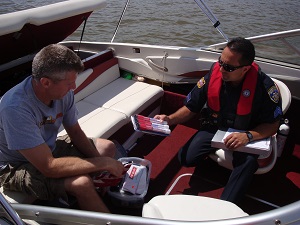
Boating Under the Influence
It is illegal to operate a vessel in New York while impaired or intoxicated by drugs or alcohol. You are considered impaired if your blood alcohol content is 0.08 or higher or if your abilities to operate safely are hindered due to substance use.
It is important to realize that on the water, even small amounts of alcohol may greatly impair one's ability to function in three critical areas: balance, coordination, and judgement. Compound this with such environmental stressors such as glare, heat, vibration, and engine noise and you can become quickly fatigued, greatly slowing your reaction time. Your ability to judge speed and distance are also impaired which can limit your ability to track moving objects.
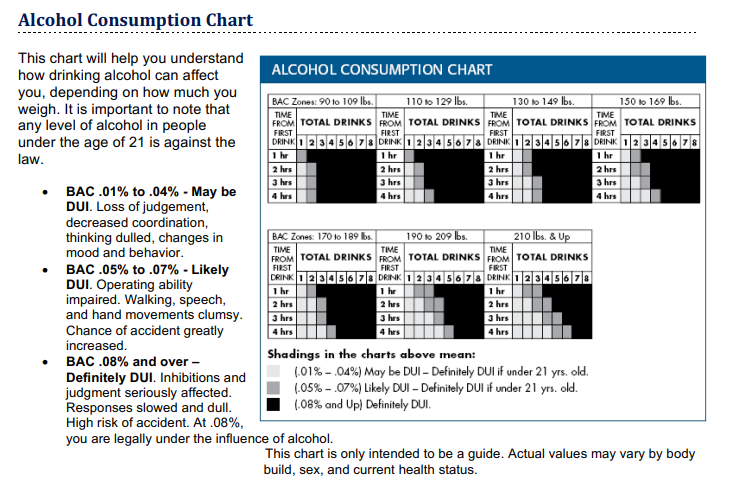
Operation Dry Water is a year-round boating under the influence awareness and enforcement campaign. A heightened awareness and enforcement weekend takes place the weekend surrounding the 4th of
July. Learn more here: https://www.nasbla.org/operationdrywater/home
Reckless Operation
Law enforcement reserves the right to terminate your voyage, if imminently hazardous conditions exist. Reckless operation is the blanket term that refers to several unsafe vessel operations, including:
- Unsafe speed: If you are operating within 100 feet of the shore, a dock, pier, raft, float or anchored boat, your speed is generally limited to 5 miles per hour. Local jurisdictions can increase this distance from shore. Like driving a car, a safe speed will be determined by the weather conditions. Slow down when visibility is poor due to fog, poor weather or darkness.
- Bow riding, which is defined as having a passenger seated in any areas not specifically designated as passenger seating while underway. This includes the bow, transom and gunwales of the boat. If the boat hits a large wake or wave, or makes a sudden, sharp turn, the person riding the bow may be thrown overboard.
- Overloading: Check the capacity plate or owner's manual of your boat. This will tell you the maximum number of people and/or weight that your boat can safely hold.
- Overpowering: Closely follow your boat manufacturer's recommendations for engine size. Larger engines go faster, but they are heavier, and your boat's transom may not be able to support them.
- Towing and Skiing: Remember that everyone being towed must always wear a lifejacket. There must be both an operator and an observer on the boat whenever anyone is being towed. Towing is prohibited between sunset and sunrise statewide.
- Lights at Night/dusk hours
- Docking lights as headlights
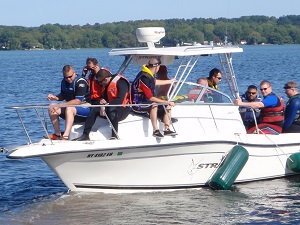
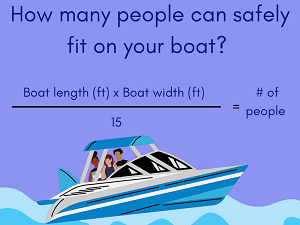
Loaner for Life lifejacket program
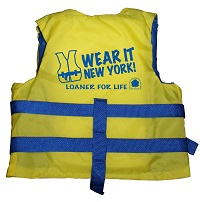
All boats must carry a US Coast Guard approved lifejacket of the proper size for each passenger on board. All boaters under 12 years of age and all recreational boaters (including paddle craft users) aboard a vessel less than 21 feet in length from November 1 - May 1 (cold water months) must be wearing their life jacket.
Don't have the proper number or sized lifejackets? New York is proud to sponsor the Loaner for Life program in which lifejackets are made available for marine law enforcement officers to lend to boaters in need. Before leaving the dock, ask a law enforcement officer for a life jacket and please return it to them when your voyage is complete.
